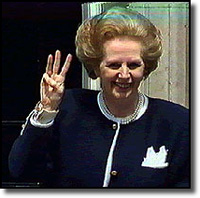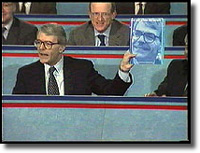
|
The 1992 General Election - Conservatives
The change in leadership had followed a dramatic slump in Tory fortunes. Early on in the Parliament the decision to press ahead with the introduction of the community charge, or 'poll tax' - which replaced the old rates system, in the face of widespread public hostility - had severely damaged the Tories. On 31 March 1990, a huge anti-poll tax demonstration in Trafalgar Square, attended by many middle class voters as well as regular anti-Conservative protesters, ended in violent clashes. Ministers began to contemplate a reversal of the policy. However, as this was a flagship Thatcherite policy, such a U-turn was impossible while Mrs Thatcher remained at the helm. Prior to the poll tax riots, Mrs Thatcher had already lost her Chancellor, Nigel Lawson, and was beginning to look increasingly out of touch with her party. On 26 October 1989, Mr Lawson had resigned in protest at her reliance on her economic adviser Sir Alan Walters. Sir Alan (standing in the coming election for the Referendum Party) strongly disagreed with the Chancellor's policy of shadowing the Deutschmark. Furthermore whilst the period 1985-1988 had been marked by strong growth, by 1990 the economy was heading for a severe recession. As the party headed into the autumn of 1990 trailing badly in the opinion polls Mrs Thatcher was increasingly viewed by many of her colleagues as a liability. The issue which was to finally seal her fate, and provide her parliamentary colleagues with the opportunity to elect a new leader, was the issue which is still dominating debate in the Conservative Party today - Europe. At Prime Minister's Questions at the end of October 1990, on her return from a European Council meeting in Rome, Mrs Thatcher made it clear to the Commons that she was entirely opposed to the idea of a European single currency and the development of a federal Europe. The sight of Mrs Thatcher crying out No, No, No' to the idea of closer European integration proved too much for Sir Geoffrey Howe, an ardent pro-European with a grudge against Mrs Thatcher. Although they had been close allies in the early Thatcher years, the Prime Minister had removed Sir Geoffrey from his post as Foreign Secretary in the July 1989 cabinet reshuffle, replacing him with the up and coming John Major. Sir Geoffrey was offered the post of Leader of the House, an offer which he clearly interpreted as a demotion, and although Mrs Thatcher sweetened the deal by also giving him the title of Deputy Prime Minister, he obviously resented the way he had been treated. On 1 November 1990 Sir Geoffrey Howe resigned. In his dramatic resignation speech in the Commons on 13 November, he attacked Mrs Thatcher's anti-European stance and called on others to consider their own response to it. This parting phrase was widely interpreted as an invitation to Michael Heseltine, Mrs Thatcher's long-time adversary who had walked out of her Cabinet in 1986 over the Westland Affair, to throw his hat into the ring and force a leadership election.
Under Mr Major, things immediately began to look better for the Conservatives. Although pollsters MORI recorded that the Government's popularity rating remained low after Major became Prime Minister (26% satisfied vs 74% dissatisfied over the course of 1991), the figures also showed that 49% of people were satisfied with Major as leader compared to only 36% dissatisfied - making Major more popular than both Neil Kinnock or Paddy Ashdown throughout the course of 1991. In contrast, Mrs Thatcher's monthly personal popularity rating in 1990 had averaged only 26% satisfied, against 70% dissatisfied. |
Diana, Princess of Wales, 1961-1997
Conference 97
Devolution
The Archive
News |
Issues |
Background |
Parties |
Analysis |
TV/Radio/Web
Interactive |
Forum |
Live |
About This Site
News |
Issues |
Background |
Parties |
Analysis |
TV/Radio/Web
Interactive |
Forum |
Live |
About This Site
© BBC 1997 |
politics97@bbc.co.uk |

